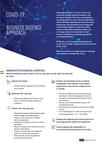
Dealing with covid 19 as a private business
The Covid-19 pandemic poses a significant global health threat, profoundly affecting people's lives and daily activities. As a result, the focus must be on implementing necessary measures to mitigate the impact of the pandemic and safeguard public welfare. Moreover, the pandemic's substantial economic uncertainty has far-reaching consequences, especially for privately owned businesses.
Navigating through uncharted territory, leaders of entrepreneurial and privately owned enterprises must proactively address the crisis by evaluating their exposure to risk, interdependencies, and eligibility for government assistance.
Government policies and funding support:
In response to the fear of a global economic slowdown, policymakers have acted swiftly, providing various support measures. However, the availability and specifics of such supports may vary depending on the location. For example, the UK has allocated £330 billion for business loans, while the US government has prioritised significant bond purchases to lower long-term interest rates.
It is crucial for business leaders to prioritize assessing how their companies can benefit from government interventions and newly introduced banking facilities. Since the landscape of support and policies is subject to frequent changes, seeking guidance from experts who can help understand these options is paramount.
Effective communication:
With voluntary or enforced isolation measures impacting teams, clear internal communication is essential to keep remote workers informed and morale high. In case of an extended shutdown, businesses should review staffing contracts and arrangements to ensure clarity on available flexibility.
Cashflow management:
Spending habits have shifted dramatically due to the pandemic, with certain sectors experiencing surges in demand while others, such as hospitality and leisure, facing sharp declines in sales.
To navigate such volatile times, businesses must regularly review cashflow projections and conduct scenario analyses to assess potential performance and cashflow outcomes under various degrees of business interruption. This data is invaluable for honest and constructive discussions with key stakeholders and funding providers.
Collaboration within the ecosystem:
The unprecedented nature of this black swan event calls for greater openness and transparency in discussions. Instead of adopting a bunker mentality, businesses should seek collaborative solutions. If a business faces exposure due to low reserves, deferring significant expenses, engaging in discussions with landlords, and increasing debt with lenders may be viable strategies. Being proactive and seeking assistance is crucial during these times.
B2C and B2B strategies:
Predicting B2C demand in the coming weeks and months is challenging due to uncertainty, making adaptability crucial for projecting sales and contingency plans. Again, such data is vital for discussions with key stakeholders, including creditors and landlords.
For businesses serving B2B markets, understanding their customer base's exposure is essential. Some organizations may suffer, while others might stand to benefit from the crisis. By focusing on providing support where needed, businesses can strengthen relationships and lay the groundwork for sustainable sales pipelines and payment structures.
The full implications of Covid-19 for society and businesses remain uncertain. This article aims to facilitate critical conversations and provide guidance for privately owned businesses grappling with their next steps.
However, it is acknowledged that this guidance might not fully address all challenges arising from the pandemic. If further assistance is required on the matters discussed above, businesses are encouraged to reach out to us for support.
Authored by Gareth Jones, Partner & Global Head of Privately Owned Business.




